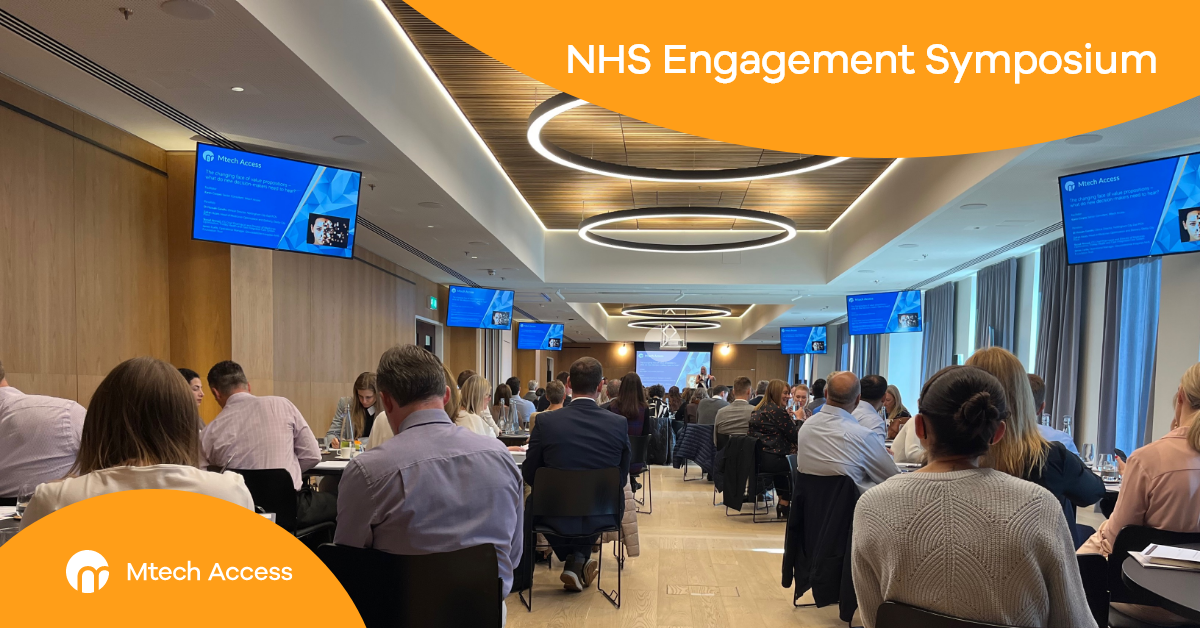
People, pathways, and payments – Mastering the key pillars of NHS engagement in 2023
Pharma and Medtech market access professionals joined us and our guest speakers from across the NHS for our NHS Engagement symposium on Thursday 29th September 2022 at The View, Royal College of Surgeons, London.
The day of the symposium…
David Thorne (Principal Associate) opened the symposium with an overview of the evolving NHS landscape, where he identified the four key things Pharma and Medtech need to be aware of in order to engage successfully with health and social care next year. He shared some of the key changes currently being implemented across the NHS, what these mean for UK market access, and the importance of strategic planning for engaging successfully with healthcare decision makers.
We then jumped into our first panel discussion featuring senior decision makers from across the NHS. The panellists explained the scope and responsibilities of decision makers, like themselves, in the new NHS structures by exploring their key objectives, how they are looking to drive change, their roles in decision-making, and where and how they interact with industry.
After a short break the panel returned to discuss how they want to engage with Pharma and Medtech and how industry can best support them in their new roles. We asked them to consider different types of value offered by new technologies, such as those relating to workforce, capacity and budgets, and which resonate with them and the challenges and objectives they face. We also shared some of the responses from our survey of our wider pool of NHS Associates, where we asked ‘What does value mean to you in your role?‘
Next, Patrick McGinley (Head of Costing and Service Line Reporting, Maidstone & Tunbridge Wells NHS Trust) gave a detailed presentation on finance and how the NHS perceives value, helping us to follow the money and understand where and how this drives NHS decision-making.
Following a networking-lunch, we returned in the afternoon for an interactive session considering ‘Pathways of Care’. Guest NHS panellists presented examples from their experience of how patient and treatment pathways, for example, are shifting out of hospital into primary and community care. They explored what these new pathways of care look like, how they are being implemented and the impact they have on where and how decisions are made.
The final session of the day saw Prof Phil Richardson (Executive Director, NHS Dorset Integrated Care Board) sum up the day and explore how the partnership between NHS and industry can be improved and how key principles for collaboration can be embedded within your engagement strategy.
Scroll down to explore the full agenda or learn more about our speakers.
Full agenda:
Session details: |
|
| 9.30–10.00 | Arrival, sign-in and networking |
| 10:00–10:20 | Four key pillars for NHS engagement in 2023 – Identifying the four key things you need to be aware of in order to engage successfully with health and social care next year. Market access changes every year, and 2023 might see the most profound changes yet. |
| 10.20–11.00 | Who are the new decision makers in the NHS? – The scope and responsibilities of new decision makers, their key objectives, how they are looking to drive change, their roles in decision-making, and where and how they interact with industry. |
| 11.00–11.20 | Coffee break |
| 11.20–12.05 | The changing face of Value Propositions – what do new decision-makers need to hear? – Consideration of different types of value offered by new technologies, such as those relating to workforce, capacity and budgets, and how they resonate with decision makers and the challenges and objectives they face. |
| 12.10–12.45 | What role does finance have in healthcare decision making? – We follow the money to understand how the NHS perceives value and the impact this has on decision-making. |
| 12.45–1.45 | Networking lunch |
| 1.45–2.45 | What are the opportunities for new pathways of care? – Examples of how patient and treatment pathways are shifting out of hospital into primary and community care, what these new pathways look like, how they are being implemented and the impact they have on where and how decisions are made. |
| 2.45–3.00 | Coffee break |
| 3.00–3.45 | How can the NHS and industry work better as partners? – We run a temperature check on how the NHS views industry, its operations, and its regulatory environment. We will explore how the partnership between NHS and industry can be improved and how key principles for collaboration can be embedded within your engagement strategy. |
| 3.45–4.00 | Closing remarks |
Guest speakers:
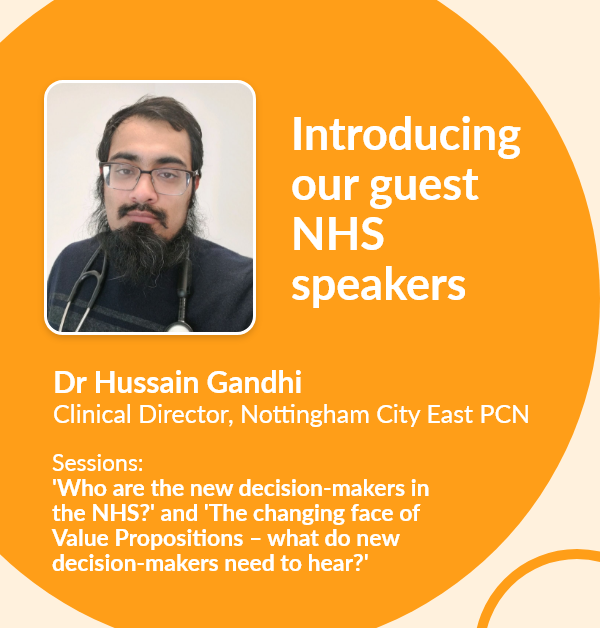
Dr Hussain Gandhi (Clinical Director, Nottingham City East PCN)
With over 20 years’ experience in primary care, Hussain is a key leader in Nottingham City East’s Primary Care Network. In addition to his role as Clinical Director, he is also Deputy Chair of Nottingham City PCN leads group. He has also founded eGPlearning, the UK’s leading primary care focused health technology YouTube channel and podcast.
As such, Hussain was able to share deep insights into the factors driving decision-making in primary care and how industry can best support clinical and strategic leaders in PCNs. Hussain was part of our morning panel sessions where we spoke with new decision-makers in the NHS to understand their roles.
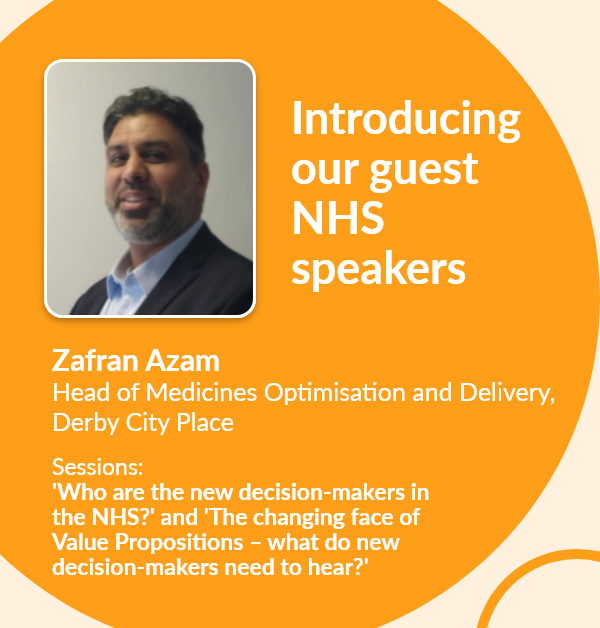
Zafran Azam (Head of Medicines Optimisation and Delivery, Derby City Place)
Zafran leads a team of pharmacists and technicians working with 31 GP practices. He has extensive experience in pharmacy across primary and secondary care, and recently played a lead role in the set up and roll-out of the COVID vaccination programme in his area. He is also the Programme Lead for the Science Technology Advisory Committee, where he analyses and collates science and technology appraisals to inform the Strategic Governance Committee, influencing the strategic direction of health and social care.
Zafran was part of our morning panel sessions where we spoke with new decision-makers in the NHS to understand their roles. We asked Zafran about his key objectives and priorities and how decision-making and strategy will develop and evolve at Place level.
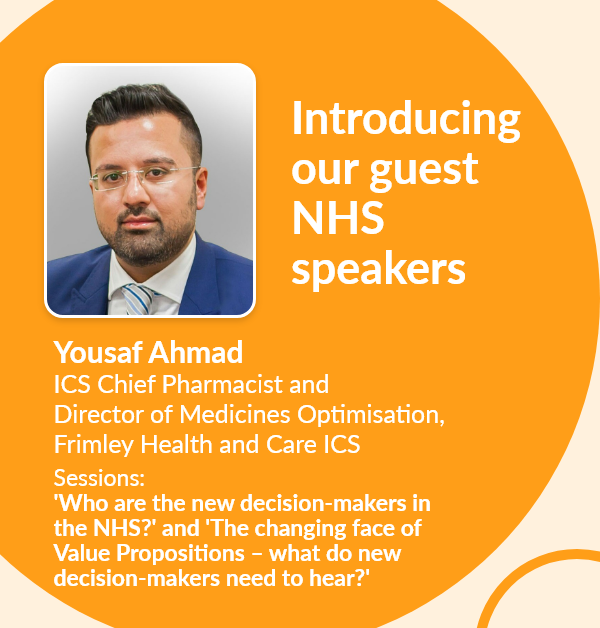
Yousaf Ahmad (ICS Chief Pharmacist and Director of Medicines Optimisation, Frimley Health and Care ICS)
Yousaf has worked in Pharmacy and in the wider pharmaceutical industry for over 20 years. He has extensive experience within secondary care, having worked primarily in large acute health boards in Scotland and in the Middle East. He represents Pharmacy at a national level through committee memberships with UK Clinical Pharmacy Association (UKCPA) and the Royal Pharmaceutical Society (RPS) bodies and as an advisor on a NICE panel committee. In 2020, he was appointed to the governing council of the General Pharmaceutical Council in the UK and is therefore responsible for the regulation of all 80,000 pharmacists and pharmacy technicians, and approximately 13,000 pharmacy premises in the UK.
Yousaf is one of the leading Pharmacy professionals in the UK and is held in great esteem internationally. He continues to work at local, national, and international platforms, to ensure the best practices of pharmacy are achieved, shared, and spread. He was part of our morning panel sessions where we spoke with new decision-makers in the NHS to understand their roles. We asked Yousaf about his priorities and his role in driving change, as a Chief Pharmacist in an ICS and a Director of Medicines Optimisation.
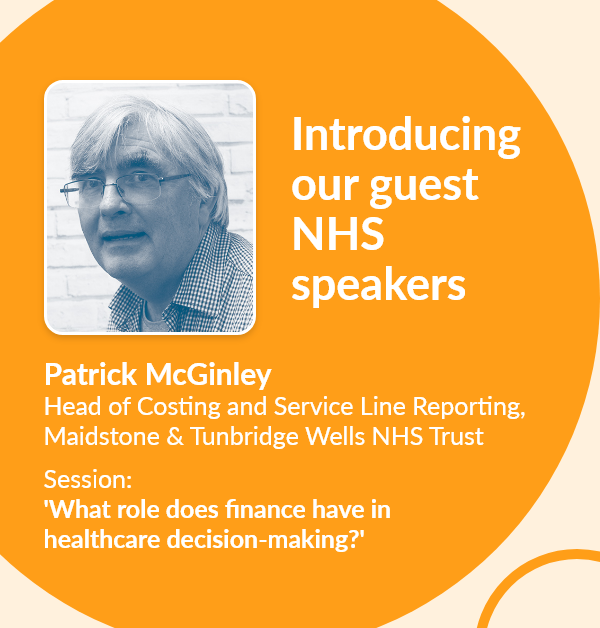
Patrick McGinley (Head of Costing and Service Line Reporting, Maidstone & Tunbridge Wells NHS Trust)
As an experienced cost accountant and service improvement teaching associate, Patrick is committed to understanding costs as a lever to provide a better view of value. Patrick is a standing member of the Diagnostic Assessment Committee, an associate member of QSIR (Quality, service improvement and redesign) teaching faculty, and a member of strategic council of the All Party Parliamentary Group on Obesity.
Patrick is one of our most popular NHS Associates due to his real-world knowledge of NHS finance and his ability to put this in to perspective for industry. Many of our Pharma and Medtech clients have reworked key aspects of their engagement strategies in light of his insights into the financial drivers behind NHS decision making. At the symposium, Patrick shared his insights in the session exploring ‘What role does finance have in healthcare decision-making?’.
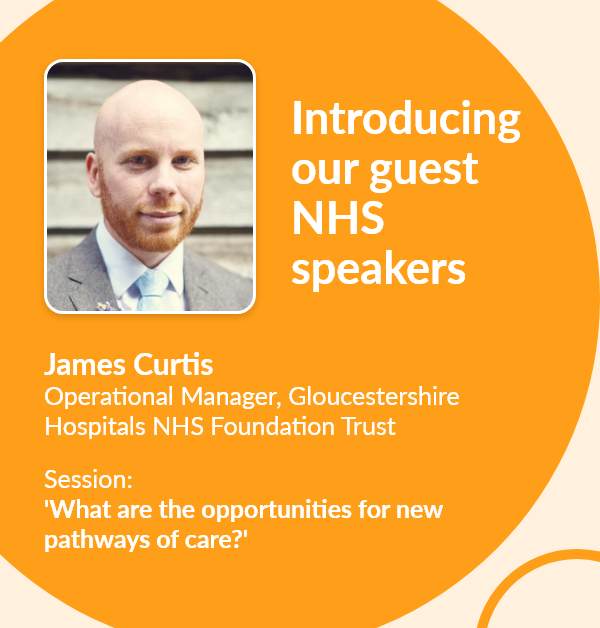
James Curtis (Operational Manager, Gloucestershire Hospitals NHS Foundation Trust)
James has gained a wide range of operational management experience in roles with Gloucestershire Hospitals NHS Foundation Trust and Gloucestershire Care Services NHS Trust, including as General Manager for Cancer Services and Screening, where he had operational responsibility for coordinating cancer pathways.
As one of the presenters in our Pathways of Care session, James presented examples from his own experience of how pathways are being transformed, what new pathways will look like and the impact this will have on where and how decisions are made. James also took part in the morning panel session on Value.
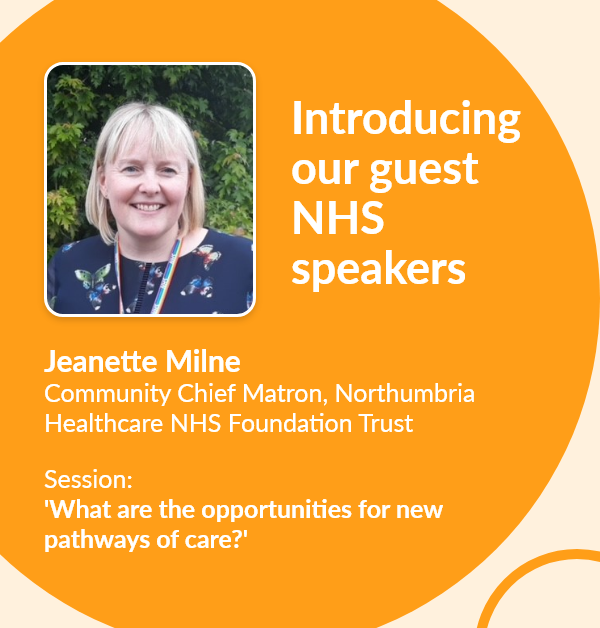
Jeanette Milne (Community Chief Matron, Northumbria Healthcare NHS Foundation Trust)
Jeanette manages community services and over 400 staff in one of the most progressive integrated care organisations of the NHS. Her organisation is currently engaged in a major outpatient parenteral antimicrobial therapy (OPAT) service review.
As one of the presenters in our Pathways of Care session, Jeanette presented examples from her own experience of how pathways are being transformed, what new pathways will look like and the impact this will have on where and how decisions are made.
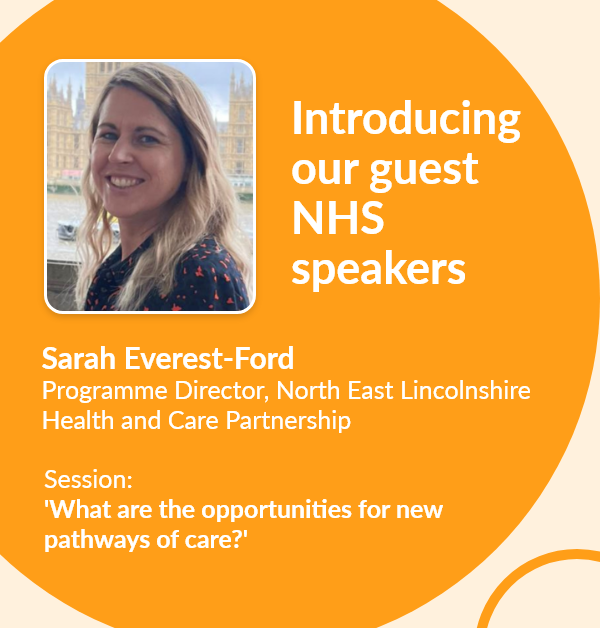
Sarah Everest-Ford (Programme Director, North East Lincolnshire Health and Care Partnership)
Sarah is a highly experienced senior healthcare leader, with a background in business development, strategy, commissioning, project and programme management, operational management and nursing. She has worked across the health and care sector for over 20 years, where she has held roles including Strategy Director at OneMedical Group, Head of Business Development and Strategy at DHU Healthcare, Assistant Chief Commissioning Officer – Integration at North Derbyshire CCG and Senior Public Health and Commissioning Manager at Nottinghamshire County Council.
As such, she has deep experience of how the NHS and wider community services can work together to deliver improved pathways of care.
As one of the presenters in our Pathways of Care session, Sarah presented examples from her own experience of how pathways are being transformed, what new pathways will look like and the impact this will have on where and how decisions are made.
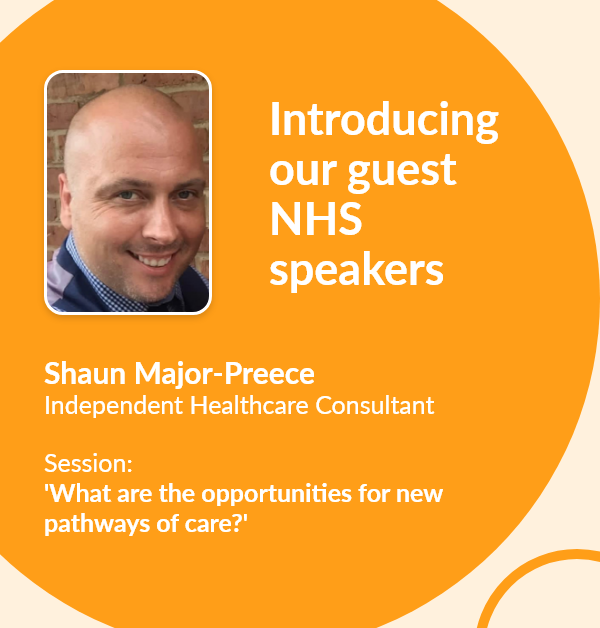
Shaun Major-Preece (Independent Healthcare Consultant)
Shaun is an experienced Advanced Nurse Practitioner, Manager and Leader, with clinical and leadership experience spanning secondary care, primary care and urgent care settings. He has held roles including Clinical Transformation Lead at OneMedical Group, Advanced Clinical Practitioner Major Trauma – Leeds Teaching Hospitals NHS Trust and Head of Nursing – Emergency Medicine at Murrumbidgee District Health Board (Australia).
Shaun spoke in our Pathways of Care session, where he shared examples from his own experience of how pathways are being transformed, what new pathways will look like and the impact this will have on where and how decisions are made.
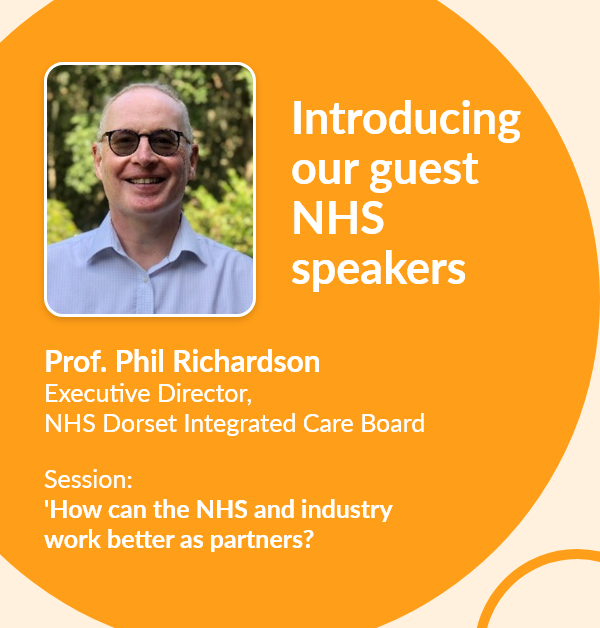
Prof. Phil Richardson (Executive Director, NHS Dorset Integrated Care Board)
Phil led the development of Dorset’s Integrated Care System (Dorset ICS) to be one of the first three in the country. He works on several collaborations across the health space in economic development, industry partnerships, digital transformation, health systems and driving new business models for innovation, research, transformation and digital. His portfolio experience covers performance, commissioning NHS services for Urgent and Emergency Care & Elective Care, digital and IT for Primary Care, strategy and planning, research and innovation, clinical services, transformation services and the portfolio management office.
For Dorset ICS, as a member of the system leadership team, he chairs the transformation & strategy board, Research Active Dorset, the Dorset informatics Group and has overall responsibility for Dorset ICS transformation portfolio delivery. Phil is also a board member of the Wessex Academic Health Science Network and chairs the NIHR Wessex Applied Research Collaborative.
Phil joined the NHS in 2014; prior to this he held international commercial senior management and board roles in the pharmaceutical, biotech, consultancy, and digital industries.
As such, he is ideally placed to explore how and where the partnership between NHS and industry can be optimised and improved. Phil spoke in our final session of the day: ‘How can the NHS and industry work better as partners?’
The venue
This year our symposium was held in The View conference room, situated on the 6th floor of The Royal College of Surgeons, London. We would like to thank the team there for their hospitality.


